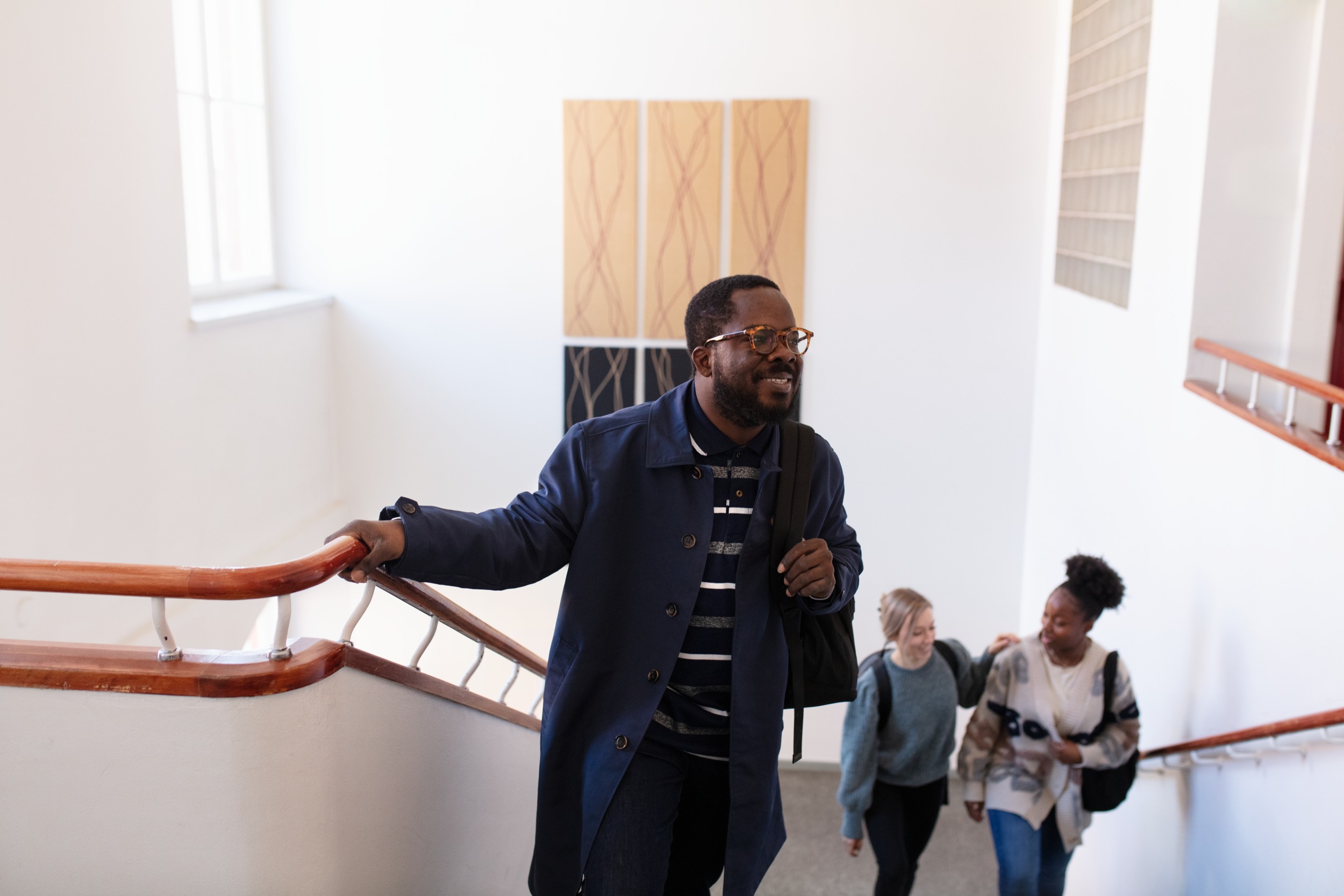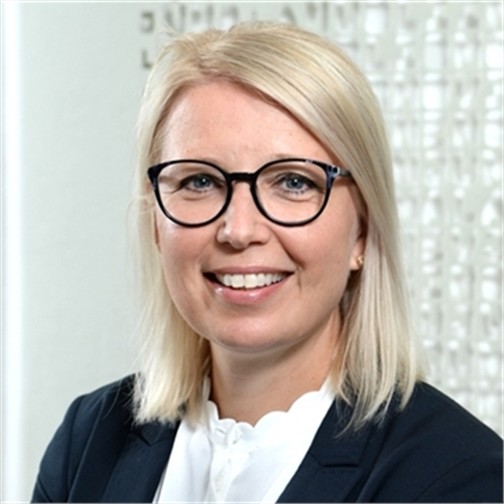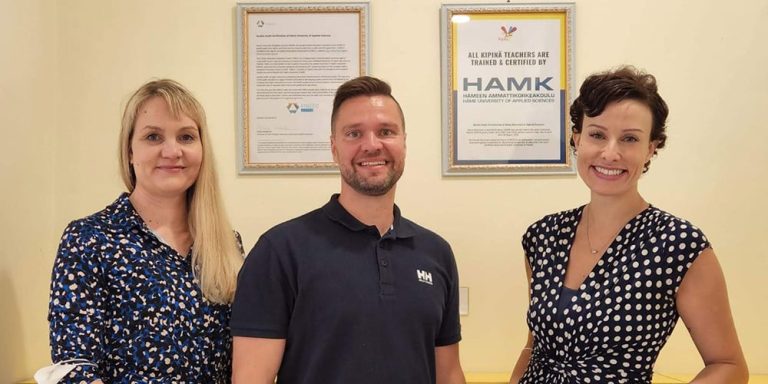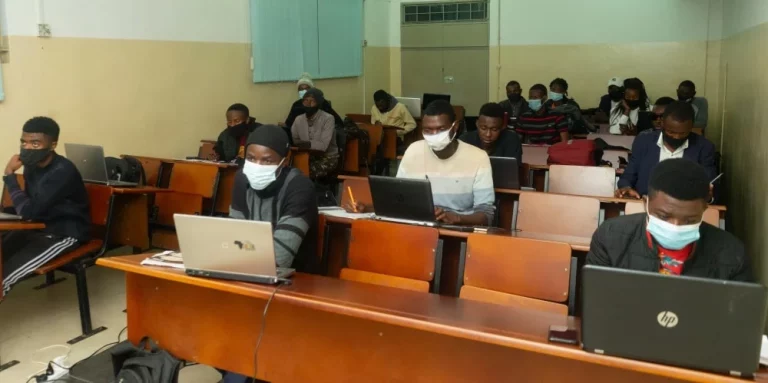
Global education
Our offer
Häme University of Applied Sciences (HAMK) is a Finnish public multidisciplinary higher education institution, which has received the highest quality label from the Finnish Education Evaluation Centre based on its deeply embedded quality culture, strongly committed staff and systematic focus on student interests.
The university offers not only higher education degrees, but also research-based initial and continuous professional teacher education, and consultation in a wide variety of international educational reforms, especially in transforming vocational, higher and early childhood education, implementing digital strategy, enhancing relevance of education and developing the 21st century pedagogy and leadership.
As an inspirational leader in continuing education, HAMK offers customer-oriented, high-quality educational products with focus on different professional disciplines for the global market, in close cooperation with ministries and authorities from Latin America, Asia, Africa and Europe.
Expertise areas
Currently, we provide services to increase the pedagogical capacity of teachers and managers in various levels and fields of education. In addition, our services include improving of educational capacity and innovation in the fields of bioeconomy, wellbeing, entrepreneurship, smart technology and circular economy.
Our partners and clients
- Ministries and authorities from different countries
- Governmental and regional development organisations
- Higher education institutions and vocational education providers
- Early childhood education institutions
- Fortune Global Top 500 corporations
Modes of Delivery
Programme in Finland
Programme in your country
Blended Programme
Online Programme
Ongoing projects and references
The Professional Development Programme for Pedagogical Experts in the region is based on the previous work conducted by the region’s pedagogical centers together with Häme University of Applied Sciences. The aim of the programme is to educate another cohort of (approx. 30) experts, who will work in the pedagogical centers in the future.
The training is a tailored programme that has the goal of developing the competencies needed in teaching higher education pedagogy to the faculty members in the universities (training-the-trainer competences). The training program is conducted fully online. The participants are awarded 12 ECTS certificates.
Client: A governmental organization in the Middle East
The project has the objective of developing Primary Teachers’ skills in using technology and digital tools in teaching and learning
The Consultant’s program is based on the competence-based education approach conducted in an online environment and consists of training, mentoring, and implementation of pedagogical development projects. The professional learning processes use versatile pedagogical approaches and digital tools. The ultimate goal is to ensure practical impact in each institution and long-term optimization of teacher education processes.
Client: Ministries of Education and Teacher Training Institutes of three Caribbean countries.
Partnering with the Ministry of Education and Technical Education of Egypt, this project aims to strengthen TVET teachers’ and trainers’ capacity to work in competence-based TVET, which is implemented in cooperation with the world of work.
The proposal for the Finnish-Uruguayan Forestry Foresight project is to develop the foresight process in applied higher education in forestry, and the related training activities, in Finland and in Uruguay. The aim is to create new methods and knowledge to serve as input to develop both universities’ operations and collaboration, in education in applied forestry higher education. The result is the creation of new models and best practices in Finland and Uruguay for future foresight processes, in close proximity to the world of work.
Client: Team Finland Knowledge programme of the Finnish National Agency for Education is funding the collaboration between HAMK and Dirección General de Educación Técnico Profesional – Universidad del Trabajo del Uruguay (DGETP-UTU).
HAMK Edu Research Unit and HAMK School of Professional Teacher Education participate in the project as specialists and developers in the field of vocational education, professional special needs teacher education and student guidance.
It is an online non-stop training programme which is tailored to meet the competence needs of early childhood education teachers. It focuses on the main principles and pedagogical methods of Finnish early childhood education.
Client: Kipinä Kids Preschools Worldwide
Previous projects and references
This project aims to bring optimizations to the teacher Education Programme developed in 2021-2022 and piloted subsequently, and more specifically towards an implementation destined for applied higher education teachers.
Client: Dirección General de Educación Técnico Profesional – Universidad del Trabajo del Uruguay (DGETP-UTU).
This is a 26-month long project which is part of Kazakhstan’s Education Modernization Project financed by the International Bank for Reconstruction and Development (IBRD, World Bank). In the project, HAMK in partnership with JAMK University of Applied Sciences (JAMK) and Autonomous Organization of Education Nazarbayev University (AOE NU) provides consulting services and expertise to the Kazakhstan universities providing pedagogical education programmes, which are the beneficiaries of the project.
The project includes four overlapping stages starting from legislative review and analysis of current practices in initial teacher education, as well as international benchmarking, improving the content and form of initial teacher education, curricula revisioning, and finally, faculty training in the beneficiary universities. The long-term result of the project is the improved quality and relevance of initial teacher education for teachers working in secondary education, and who are responsible for implementing the newly reformed secondary education curricula. The education modernization project is aligned with the human capital driven strategic approach of the Republic of Kazakhstan according to the State Program of Education and Science Development 2016-2020 (SPESD).
Client: The Ministry of Education and Sciences of the Republic of Kazakhstan
The goal of the project is to investigate key competences, both domain-specific and generic, in highly employable industries in Europe that are strongly experiencing digital disruption and automation. Based on the research results the project aims to co-create new training solutions for learning at work with partner companies including digital cMOOC for competence developers.
Funded by Erasmus, the project is to develop future cohorts of teachers in Europe and beyond who are both globally competent themselves and have the skills to develop global competence in their students.
This project will establish an international Global Competence Network of Educators to help the project consortium analyse and develop global competence curricula, materials and trainings within national teacher education programs. It will also foster better intercultural education practices, including through teacher and student mobility and the use of virtual reality technology to enable non-mobility based experiences and sharing.
Assignment name: Talent and Skills for the Agroforestry Sector in Uruguay
Summary: About 60 managers and responsible teachers in agroforestry education participating in the training programme in different stages. Duration: 3 years
This training programme aims at improving the relevance of Uruguay’s technical and vocational education (level II), professional Higher Education (level III) and professional education for Sustainable Development of Agro-Forestry Industry, by implementing a professional development program and institutional capacity building project for TVET (Nivel II) and professional higher education teachers (Nivel III) who wish to develop their educational institutions and increase their own competence in modern pedagogy. It also provides professional development for managers of TVET and professional higher education institutions who are responsible for pedagogical and institutional management.
The program provides tools, ideas, methods, theories, and world-renowned models, examples and concepts to enhance the relevance of TVET and professional higher education in the Uruguay’s agroforestry sector. The program is oriented on pedagogical models and the design of competence-based education, and specifically focused on the agroforestry education development.
The STRENGTh project focuses on increasing Social and Emotional competence of career counsellors. It aims to propose concrete solutions to train a new generation of socially aware career guidance professionals who are able to develop and use interpersonal and social intelligence skills to successfully build professional relationships and navigate diverse social environments.
This project aims to seek ways to ensure that the skills of VET (Vocational Education and Training) teachers meet the needs of the working life now and in the future. It also explores ways to improve teacher’s professional learning.
The partners of the project: five organizations from Finland including HAMK, the United Kingdom and Netherlands.
Assignment name: A Study Tour to Finland to Visit an Accredited Academic Institution That Specialises in Forestry Sciences
Summary: 4 experts from Tshwane University of Technology (TUT) and United Nations Industrial Development Organisation (UNIDO) participated in the training programme. Duration: 1 week
This is the knowledge-transfer study tour with the aim of helping the participants to develop a forestry curriculum higher education qualification. The programme covered strategies for curriculum design and development, and awareness of content and activities for teaching forestry subjects (relating to modes of study).
Client: United Nations Industrial Development Organisation (UNIDO), Tshwane University of Technology (TUT)
Assignment name: INFOTEP Vocational Education Development Programme
Summary: 60 educational experts and managers from INFOTEP participating in the training programme. Duration: 12 months.
This professional development programme is aimed for education administrators and managers, and through their intermediary for teachers, who wish to increase their own competence in modern pedagogy and pedagogical management, and develop their educational institutions. The programme provides tools, ideas, methods, theories, and world-renowned models, examples and concepts to enhance managers’ and teachers’ professional identity from education professional to a school developer and pedagogical expert.
Client: INFOTEP in Dominican Republic
It is an online non-stop training programme which is tailored to meet the competence needs of early childhood education teachers. It focuses on the main principles and pedagogical methods of Finnish early childhood education.
Client: Kipinä Kids Preschools Worldwide
The Future Work research team of HAMK Edu contributed to the European development project DC4WORK (Work-based learning in a digital age – promoting digital competences for better employability & innovation) in 2017-2019. The goal of the Erasmus+ -funded initiative was to research and promote digital competences, in reference to the EU’s Digital Competence Framework 2.0 and continuous learning in small and medium-sized enterprises. There were five countries collaborating on the project: Austria, Belgium, Finland, Germany and Portugal. The partners compared their national policies and flagship development projects of digitalisation and applied research of digital competences in SMEs.
On the basis of the study results, the project partners developed an open web-based “Toolbox 4.0” for the use of digital promoters in companies and in educational institutions (www.dc4work.eu) as well as guidelines to support promoters in facilitation of learning digital competences at work. The contribution of Finnish partners focused on pedagogical expertise, for instance, developing learning methods and models for continuous learning at work and facilitating collaboration between educational institutions and companies. The methods included e.g. the development of an open digital badge and a MOOC (massive open online course) for facilitating digital competences at work.
More information:
Project website: www.dc4work.eu
Dr. Essi Ryymin, Project Manager
essi.ryymin@hamk.fi
This is a tailored programme to support the client’s vision of building a professional teacher academy in the future.
The training program starts with a 2-month intensive face-to-face course in Finland followed by a 4-month development project in the client’s home country. The development project focuses on each participant’s own development project within his / her own institution, as well as the cooperation network that has been formed between the participating teachers.
The participants are awarded 22 ECTS certificates. 2 cohorts have completed this training programme
Client: a governmental organization in the Middle East
Assignment: Community and Industry Based Forest Management “Professional Development Training”
Summary: 9 forestry advisers from Indonesia participated in the training program. Duration: 6 + 4 weeks.
This training program is designed to help the participants to build entrepreneurial spirit and competences in the communities to reach the wealth potential that forests can offer.
The training program starts with a 6-week intensive face-to-face course in Finland followed by a development project in Indonesia. The development project focuses on the practical application of the newly learned methods in the local learning environments and through the development work.
The participants are awarded 10 ECTS credit points certificates.
Client: a governmental organization in Indonesia
Assignment: Training on Renewable Energy
Summary: 15 managers of the top management level from a Top 500 energy corporation in China participated in the training program. Duration: 2 weeks.
This program presents to the participants the latest technology development and the best practices in the area of renewable energy from Finland.
Client: A Top 500 energy corporation in China
Assignment name: Gira Mundo Finlândia Paraíba -Professional Development Programme
Summary: 100+ teachers have participated in the training programme. Duration: 8 months/group (Appr. 20 teachers per group, in total 6 cohorts: 10/2016, 10/2017, 03/2018, 08/2018, 10/2018, 10/2019).
Gira Mundo Finlândia Paraíba – Professional Development Programme is a continuing education programme for teachers in basic, secondary and vocational education. The programme is divided into two parts. The first part is in Finland, where the participants have an intensive training for two months having both practical, hands-on experiences and thematic observations, as well as theoretical insight into the core components of student-centered education and innovative pedagogy. The second phase of the programme concentrates on the practical application of the newly learned methods in the local context and it is guided by HAMK experts using e-learning methods and environments.
The participants are awarded 12 ECTS credit points certificate on level seven of the Bologna frame of reference.
Client: The Federal State of Paraíba, Brazil
Blog
Recent news
Contact us



